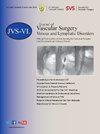Oral sirolimus therapy for patients with complex low-flow vascular malformations
IF 2.8
2区 医学
Q2 PERIPHERAL VASCULAR DISEASE
Journal of vascular surgery. Venous and lymphatic disorders
Pub Date : 2025-05-19
DOI:10.1016/j.jvsv.2025.102261
引用次数: 0
Abstract
Background
The evidence on the efficacy and safety of sirolimus therapy in patients with low-flow vascular malformations (LFVMs) has indicated its potential benefit in extensive and complicated lesions. This study aimed to assess the efficacy and safety of oral sirolimus therapy on complex LFVM patients when standard treatment alone was inadequate.
Methods
This was a retrospective study of all adult patients with diagnosed LFVMs who were treated with oral sirolimus where standard therapy was inadequate in a single specialist center from May 1, 2016, to April 30, 2023. Demographic and clinical data including patient reported responses, visual analogue scores for pain and adverse effects, and quality of life (QoL) scores (Short Form-36) were reviewed.
Results
We included 55 LFVM patients (14 with syndromic disease and 41 with nonsyndromic) with a median age of 41 years (range, 23-72 years). While on sirolimus, 32 patients (58.2%) experienced some improvement with a nonsignificant higher percentage of nonsyndromic patients experiencing some improvements (P = .6478). There was a nonsignificant improvement in the quality of life scores for physical problems, energy/fatigue, and pain. There was also a nonsignificant increase in anxiety and depression scores. There was a significant decrease in the lesion size (P = .0004). Two patients reported a cessation of cellulitis episodes, and eight patients reported a partial or complete reduction in bleeding from their malformation or rectal bleeding. The most common side effects reported were mouth ulcers (54.5%), fatigue (29.1%), headache (25.5%), gastrointestinal problems (25.5%), and rash (12.7%); only five patients (9.1%) did not report any side effects. No significant difference was found between the side effects reported by syndromic and nonsyndromic patients.
Conclusions
Oral sirolimus therapy was clinically effective and safe in patients with complex LFVMs when standard therapy alone was inadequate. Further studies with longer follow-up are needed to evaluate oral sirolimus therapy in LFVM patients.
口服西罗莫司治疗复杂低流量血管畸形。
关于西罗莫司治疗低流量血管畸形(LFVM)患者的有效性和安全性的证据表明其对广泛和复杂病变的潜在益处。本研究旨在评估在单纯标准治疗不充分的情况下,口服西罗莫司治疗复杂LFVM患者的疗效和安全性。方法:这是一项回顾性研究,研究对象为2016年5月1日至2023年4月30日在单一专科中心接受口服西罗莫司治疗的所有诊断为lfvm的成年患者。回顾了人口统计学和临床数据,包括患者报告的反应、疼痛和不良反应的视觉模拟评分以及生活质量(QoL)评分(SF-36)。结果:纳入55例LFVM患者(14例综合征性疾病,41例非综合征性疾病),中位年龄41岁(范围23 ~ 72岁)。32名患者(58.2%)在使用西罗莫司时得到了一些改善,非综合征患者得到一些改善的比例没有显著性提高(p=0.6478)。在身体问题、精力/疲劳和疼痛方面的生活质量评分没有显著改善。焦虑和抑郁得分也没有显著增加。病变大小明显减小(p=0.0004)。2例患者报告蜂窝织炎发作停止,8例患者报告其畸形出血或直肠出血部分或完全减少。最常见的副作用是口腔溃疡(54.5%)、疲劳(29.1%)、头痛(25.5%)、胃肠道问题(25.5%)、皮疹(12.7%),只有5例(9.1%)未报告任何副作用。综合征和非综合征患者报告的副作用无显著差异。结论:在单纯标准治疗不足的情况下,口服西罗莫司治疗复杂性LFVM临床有效且安全。需要更长随访时间的进一步研究来评估口服西罗莫司治疗LFVM患者。
本文章由计算机程序翻译,如有差异,请以英文原文为准。
求助全文
约1分钟内获得全文
求助全文
来源期刊

Journal of vascular surgery. Venous and lymphatic disorders
SURGERYPERIPHERAL VASCULAR DISEASE&n-PERIPHERAL VASCULAR DISEASE
CiteScore
6.30
自引率
18.80%
发文量
328
审稿时长
71 days
期刊介绍:
Journal of Vascular Surgery: Venous and Lymphatic Disorders is one of a series of specialist journals launched by the Journal of Vascular Surgery. It aims to be the premier international Journal of medical, endovascular and surgical management of venous and lymphatic disorders. It publishes high quality clinical, research, case reports, techniques, and practice manuscripts related to all aspects of venous and lymphatic disorders, including malformations and wound care, with an emphasis on the practicing clinician. The journal seeks to provide novel and timely information to vascular surgeons, interventionalists, phlebologists, wound care specialists, and allied health professionals who treat patients presenting with vascular and lymphatic disorders. As the official publication of The Society for Vascular Surgery and the American Venous Forum, the Journal will publish, after peer review, selected papers presented at the annual meeting of these organizations and affiliated vascular societies, as well as original articles from members and non-members.
 求助内容:
求助内容: 应助结果提醒方式:
应助结果提醒方式:


